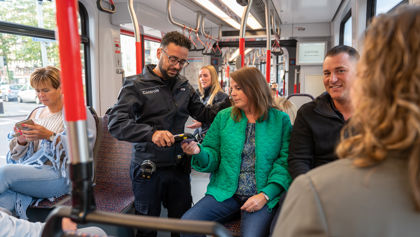Special Investigating Officer

There are more than 100 Special Investigating Officers working at HTM, who monitor social security in our vehicles and at the stops. They check tickets, monitor HTM’s house rules and are authorised to issue fines if passengers do not have valid tickets or are not obeying the rules.
Collaboration
The General Terms and Conditions for Urban and Regional Transport 2015 and the Passenger Transport Act 2000 (both only available in Dutch) are the basis for the work of the Special Investigating Officers. They are authorised to fine and detain fare dodgers and rule-breakers. HTM and the police concluded agreements about this in a covenant (in 2006 together with so called the Haaglanden police). This covenant is based on the Special Investigating Officers Decree 9247. One of the agreements in the covenant is that HTM’s Flexible Support Team can carry suspects to the police station itself in specially-equipped buses. If a suspect absolutely refuses to cooperate or does not want to be taken by HTM, the company asks the police for assistance. When a Special Investigating Officer uses their criminal authority, they have to justify their action to the Ministry of Justice. For this part of their work they justify their action to the regional Chief of Police in that person’s capacity as immediate supervisor and the Chief Public Prosecutor in that person’s capacity as supervisor.
Training
HTM trains its Special Investigating Officers for working in the public transport sector. This extensive training includes legislation, behavioural training and practical experience. In contrast to the standard Special Investigating Officer examinations, the Special Investigating Officer Public Transport examinations include more difficult questions about understanding. In addition, HTM tests their knowledge about rules and legislation and behavioural skills. In order to be better involved with the content of the job, HTM Special Investigating Officers take annual tests by means of partial examinations. Special Investigating Officers also sit examinations every year in dealing with aggression, behavioural skills and techniques in approaching people. Teachers at the Police Academy perform these examinations for all Special Investigating Officers, so that they can keep their skills in dealing with violence up to date, just like police officers This examination is based on the Regulation for Testing the Management of Violence by Special Investigating Officers, which contains a practical section covering arresting techniques and self defence, as well as a theoretical part dealing with violence control.
Authorities
The Policy Rules for Special Investigating Officers (version 10 July 2017, 36058) and the Police Act 2012 describe in detail the tasks and authorisations Special Investigating Officers have in the performance of their jobs. They are authorised to use violence and may use handcuffs and batons. However HTM’s Special Investigating Officers do not use batons because they are trained to deal with tense situations. In the event of an offence on a bus or a tram they can detain the persons involved and take them to the police station. HTM’s Special Investigating Officers monitor compliance with the General Terms and Conditions for Urban and Regional Transport 2015, the Passenger Transport Act 2000 referred to above and the HTM travel rules. HTM applies these travel rules to make journeys as pleasant as possible for every passenger.

